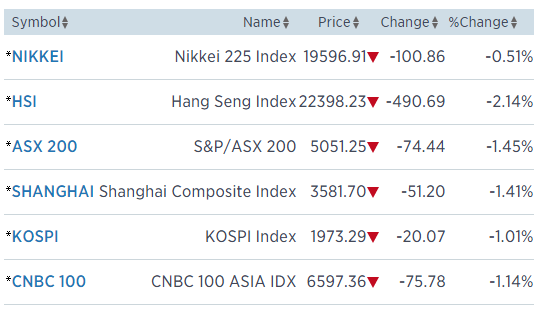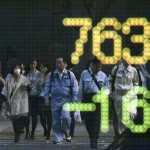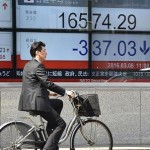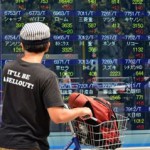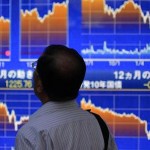Asian stocks bruised by tumbling oil, Fed hike jitters
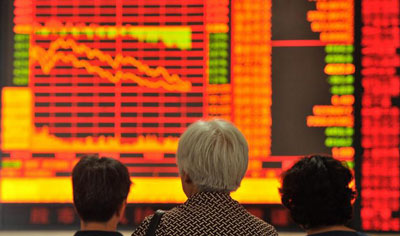
Asian stocks were battered on Friday, with risk-off sentiment in full swing amid sharp falls in the price of commodities and growing expectations that the Federal Reserve is on track for a rate hike in December for the first time in nearly a decade
Crude prices hit two-and-a-half-month lows on Thursday after the U.S. government reported a stockpile build four times above market expectations. West Texas Intermediate crude was last seen 0.5 percent lower at $41.55 a barrel in Asian trade.
Meanwhile, gold was stuck near a six-year low on Friday and copper also fell to its weakest level in more than six years, hurt by a strong dollar and persistent concerns over China’s economy.
“We blame China’s economic data for the latest drop in commodity prices, [especially] in copper. The close relation between the CRB index and the U.S. dollar broke down in June. The subsequent 9.6 percent decline in the CRB looks outsized against the 2.0 percent rally in the dollar index. We infer that China growth uncertainty displaced dollar as the driver of commodity prices,” Tim Condon, head of research for Asia at ING Financial Markets, wrote in a note released Friday.
As such, major U.S. averages slumped more than 1 percent each overnight, as investors eyed several speeches from Fed officials that hinted at an interest-rate hike next month. Wall Street posted its worst day since September 28, with the S&P 500 ending lower year-to-date for the first time since October 22 and the Dow Jones Industrial Average off more than 250 points.
“Markets have been mulling over the [October] nonfarm payrolls numbers all week, but the big selloff we have been seeing in the past 24 hours seems indicative that they have come to a conclusion: they’re not happy about it. A rate hike by the Fed in December seems almost palpable now, and markets are still scrambling to reposition themselves ahead of it,” IG’s market analyst Angus Nicholson said.
China stocks down
China’s benchmark Shanghai Composite closed down 1.4 percent, driven lower by commodity-related names.
State-owned Baoshan Iron & Steel Co and China Northern Rare Earth were the biggest losers, down over 5 percent each. PetroChina and Sinopec tanked 1.9 and 2.1 percent respectively.
Huaneng Power International plans to sell HK$5.7 billion ($736 million) of new H-shares, raising capital to repay bank loans and for working capital. Shares of the listed unit of China’s biggest power generator Huaneng Group dipped 0.1 percent in Shanghai, while its Hong Kong-listed stock skidded 7.9 percent.
Meanwhile, aluminium giant Rusal slumped 2.4 percent in Hong Kong after reporting an 11 percent fall in third-quarter core earnings from a year earlier.
As such, the benchmark Hang Seng index lost 2.2 percent, a day after outperforming the region with a near 2 percent rally, following an announcement by MSCI that it would add overseas-listed Chinese stocks such as Alibaba to its emerging market index.
Investors were also awaiting Hong Kong’s third-quarter gross domestic product (GDP) due at 4.30pm local time.
Economic growth for the July-September period likely ticked up just 0.1 percent on-quarter, the report from Moody’s Analytics said, down from a seasonally adjusted 0.4 percent in the three months to June. On a year-on-year basis, Hong Kong’s economy is expected to grow 2 percent, compared with 2.8 percent in the second quarter.
“Weak mainland demand is dragging on the small open economy, pushing down export growth. Rising house prices and low oil prices should support consumption growth, though offset somewhat by the decline in the stock market,” analysts wrote.
Nikkei sags 0.5%
Japan’s Nikkei 225 index snapped a seven-day winning streak, but appetite for banks helped to offset some losses.
Mitsubishi UFJ Financial Group charged up 1.5 percent after announcing plans to buy back around 100 billion yen of its own shares, according to a Nikkei report. Sumitomo Mitsui Financial Group (SMFG) erased earlier losses to end flat, following news that it is looking to buy General Electric’s Japan-based leasing business, the Nikkei reported.
Toshiba tumbled 5.9 percent after the embattled electronics giant confirmed its U.S. nuclear unit Westinghouse booked losses in 2012 and 2013.
Large-cap Inpex fell 1.8 percent, while mining and metal stocks such as Toho Zinc and Sumitomo Metal Mining declined 2 and 2.3 percent respectively.
ASX skids 1.5%
Australian equities came off the day’s lows, but a meltdown among resources counters kept the S&P ASX 200 index firmly at its lowest level since October 2.
Santos led the fallers, down nearly 8 percent, after a A$1.17 billion ($827 million) institutional rights offer. Shares of the oil and gas producer raised slumped 16.5 percent on Thursday.
Gold producers Evolution Mining and Newcrest Mining closed down 5.3 and 4.1 percent respectively, while global miner BHP Billiton crashed 1.8 percent to a seven-year low, following last week’s deadly dam disaster at a joint venture mine in Brazil.
Brazilian President Dilma Roussef said on Thursday that the country’s environmental regulator would fine the Samarco Mineracao iron ore mine, as well as joint-owners BHP and Brazil’s Vale, $66.2 million for the burst that killed seven people.
Banks were also in the red, with Commonwealth Bank of Australia losing 2.1 percent. Australia and New Zealand Banking and National Australia Bank closed down more than 1 percent each.
Nine Entertainment Co Holdings and Southern Cross Media were in focus after The Australian newspaper reported they were in talks to merge. Shares of the former finished 3.9 percent lower, while the latter gained 0.5 percent.
Kospi loses 1%
South Korea’s Kospi index was taken lower to a near six-week trough by lagging automakers.
Kia Motors and Hyundai Motor closed down more than 2 percent each, while Ssangyong Motor retreated 0.5 percent.
Refiners and chemicals turned mixed by late-day trading even as the outlook for oil remained gloomy. SK Innovation and S-Oil made losses of 1.3 and 0.3 percent respectively, but LG Chem rebounded 0.5 percent.
Samsung Electronics, which unveiled its next-generation high-end chipset on Thursday, declined 1.3 percent.
KLCI dips 0.1%
Malaysia’s economy grew by the slowest pace in more than two years in the July-September quarter, according to official data released on Friday.
The Southeast Asian economy expanded 4.7 percent in the third quarter from a year earlier, below second quarter’s 4.9 percent which marked the Southeast Asian economy’s slowest pace of growth since the third quarter of 2013. Economists polled by Reuters had expected growth of 4.7 percent.
“A broader story is that we are seeing a slow, grinding moderation in growth. As we move into the next few quarters, we will see further slowdown in domestic demand,” Credit Suisse’s Michael Wan told Reuters.
“The Bank Negara Malaysia (BNM) is limited in terms of policy options. Cutting interest rates might be self-defeating in the sense that they would have to intervene to curb volatility in exchange rates. A bigger point is that the current level of current account surplus is a very low buffer to potential capital outflows. The ringgit still remains vulnerable,” the Singapore-based analyst added.
The benchmark FTSE Bursa Malaysia KLCI index steadied at modest losses with the GDP figure in line with expectations, while the ringgit weakened 0.2 percent to 4.3700 against the U.S. dollar.
Source: CNBC – Asian stocks bruised by tumbling oil, Fed hike jitters









